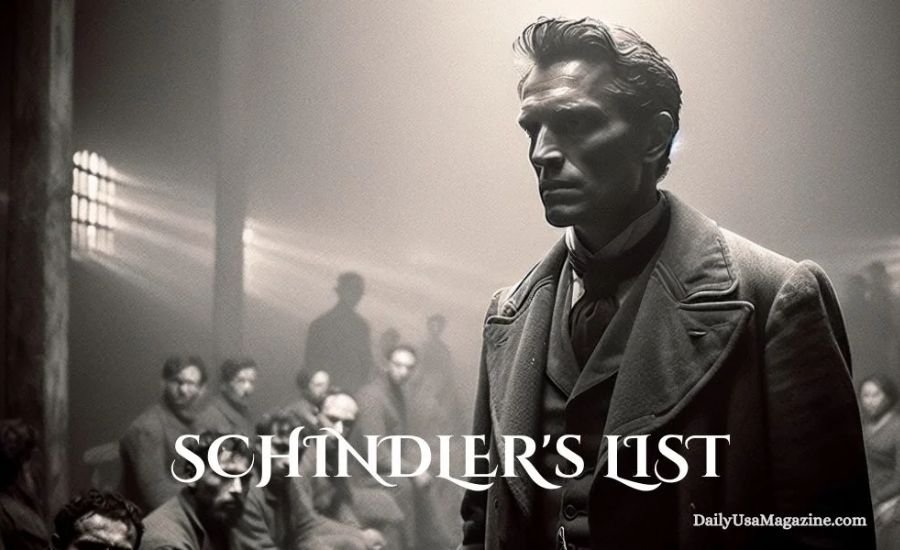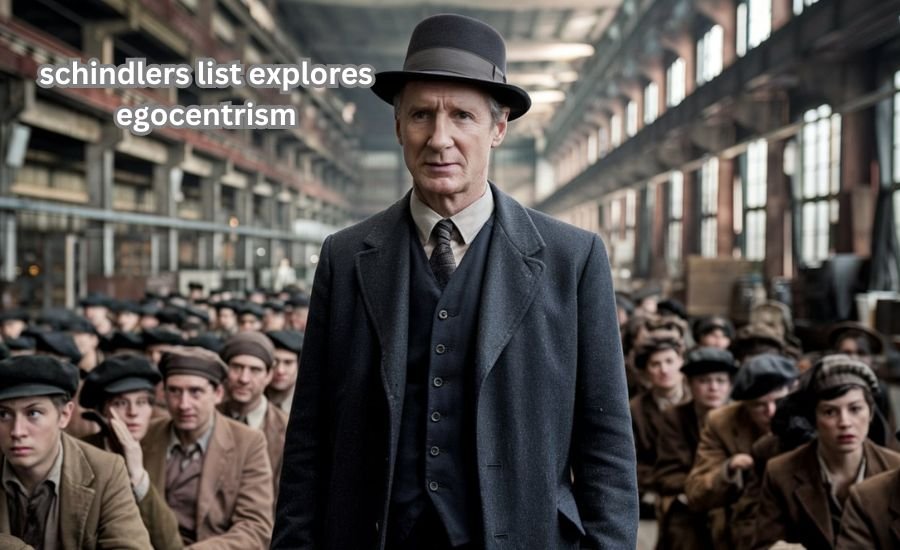Welcome to blogrouters.com, where we explore the hidden meanings and social impacts of iconic films. Today, we dive into Schindler’s List, a film that goes beyond historical recounting to deeply examine themes of egocentrism and ethnocentrism. Schindlers list explores egocentrism and ethnocentrism ,This powerful movie challenges us to think critically about human nature, moral decisions, and cultural biases. With an unforgettable portrayal of the Holocaust, Schindler’s List highlights both the selfish and selfless sides of humanity. Our analysis will show how the film’s depiction of egocentrism and ethnocentrism brings out the profound complexity of ethical behavior in times of crisis.
The Role of Egocentrism in Schindler’s List
Egocentrism, a psychological tendency where individuals center their world around themselves, plays a critical role in Schindler’s List. The film masterfully illustrates how personal ambitions can overshadow empathy, particularly through the actions of characters like Oskar Schindler and Nazi officials.
Definition of Egocentrism: Egocentrism is a psychological trait where individuals perceive and interpret the world primarily through their own experiences, often neglecting the perspectives and feelings of others.
Initial Ambitions of Oskar Schindler: Schindler starts his journey in Schindler’s List as a cunning businessman, driven by the desire for wealth and social status. His initial focus on profit illustrates a strong egocentric perspective, where financial gain takes precedence over humanitarian concerns.
Detachment from Reality: Throughout the early parts of the film, Schindler remains emotionally detached from the horrific realities faced by the Jewish community, showcasing how egocentrism can create a barrier to understanding others’ suffering.
Turning Point: A critical shift occurs when Schindler begins to witness the brutality inflicted upon the Jewish population. This exposure forces him to confront the consequences of his self-centered actions, igniting a profound internal transformation.
Transition to Empathy: As Schindler’s perspective shifts from egocentrism to empathy, he becomes increasingly motivated to save lives rather than solely focusing on profit. This transformation highlights the potential for personal growth and ethical awareness when faced with the suffering of others.
Contrast with Nazi Officials: The Nazi characters in the film exemplify egocentrism at its most extreme, driven by an ideology that prioritizes their perceived superiority over the well-being of the Jewish community. Their ruthless self-interest fosters an environment of hatred and violence.
Moral Implications: The film illustrates that egocentrism can lead to moral depravity when unchecked. The actions of Nazi officials serve as a cautionary tale about the dangers of placing self-interest above collective humanity.
Reflection of Societal Issues: Schindler’s List serves as a powerful commentary on the consequences of egocentrism in society. It encourages viewers to recognize the importance of empathy and the ethical responsibility individuals hold toward one another, especially in times of crisis.
Encouragement for Change: Schindlers list explores egocentrism and ethnocentrism journey illustrates that it is possible for individuals to evolve beyond their egocentric tendencies. This theme serves as a reminder of the capacity for change within all of us when we engage with the broader human experience.
Read Next : Newsimpledynamicclient
Ethnocentrism as a Driver of Conflict in the Film

Ethnocentrism, or the belief in the inherent superiority of one’s own ethnic group, is a deeply ingrained theme in Schindlers list explores egocentrism and ethnocentrism. The Nazis’ sense of Aryan superiority underpins their genocidal policies, leading to the systematic dehumanization of Jewish communities. The film does not shy away from showing how this ethnocentric worldview facilitates the justification of unspeakable crimes.
For Schindler, ethnocentrism initially influences his interactions with Jewish people. His perspective reflects societal biases, viewing the Jewish community as a means to economic success rather than as individuals deserving respect and dignity. As he becomes more involved in their plight, Schindler’s ethnocentrism dissolves, replaced by a profound respect and urgency to protect innocent lives.
Through Schindler’s evolving empathy, the film challenges audiences to question their own biases and examine how ethnocentric beliefs can lead to injustice. This portrayal encourages viewers to consider the dangers of ethnocentrism, especially when coupled with power and prejudice.
How Schindler’s List Reflects the Power of Human Transformation
One of the most powerful messages in Schindler’s List is the ability of individuals to transform their beliefs and actions. Schindler’s journey from a self-centered businessman to a savior of hundreds exemplifies the potential for personal growth and ethical awakening. The film highlights that, even within a society marked by egocentrism and ethnocentrism, individuals have the capacity for positive change.
This transformation is significant because it shows that moral courage often emerges from unexpected places. Schindlers list explores egocentrism and ethnocentrism eventual commitment to saving lives contrasts sharply with the unwavering adherence to hateful ideologies displayed by Nazi officials. The movie leaves viewers with a poignant reminder that people are capable of choosing empathy over prejudice, even under extreme circumstances.
This message is not only uplifting but serves as a call for individuals to recognize the power of personal choice in combating hate and discrimination.
The Moral Responsibility Highlighted in Schindler’s List

As Schindler’s List reaches its climax, the concept of moral responsibility becomes central. Schindler’s actions demonstrate that egocentric motivations can evolve into selfless commitment to others’ well-being. The emotional weight of his realization, that he could have done more to save lives, reinforces the theme of accountability. Schindlers list explores egocentrism and ethnocentrism.
This moral responsibility extends beyond Schindler to the viewers, urging them to consider their roles in promoting empathy over self-interest. The film suggests that understanding the impact of one’s choices is crucial in any social or political climate, a lesson that resonates far beyond the historical events depicted.
Through Schindlers list explores egocentrism and ethnocentrism story, the audience is reminded of the importance of active compassion, even when it requires personal sacrifice. This reflection on moral responsibility encourages viewers to evaluate how their actions, big or small, can contribute to a more just world.
Conclusion
Schindler’s List is more than a historical recount; it’s a profound exploration of human values, examining egocentrism, ethnocentrism, and the power of personal transformation. Through Schindler’s journey, the film urges us to confront our biases, consider the impact of our actions, and recognize the potential for empathy to overcome prejudice. This story remains a powerful reminder of the resilience of the human spirit, even in the darkest of times.
The moral and ethical lessons from Schindler’s List resonate as a call to remember history, understand the depths of human compassion, and reflect on our own choices in the face of injustice. It’s a narrative that continues to inspire, moving us to think, question, and act for the betterment of all.
FAQs
Q: What themes does Schindlers list explores egocentrism and ethnocentrism List explore?
A: The film explores themes of egocentrism, ethnocentrism, moral responsibility, and human transformation.
Q: How does Schindler’s character evolve in the movie?
A: Schindler starts as a businessman focused on profit, but he gradually becomes a protector of Jewish lives, showing profound personal growth.
Q: What is the significance of egocentrism in Schindler’s List?
A: Egocentrism shows how self-interest can overshadow empathy, but it also highlights the potential for change when confronted with others’ suffering.
Q: Why is ethnocentrism a key theme in the movie?
A: Ethnocentrism is central to the Nazi ideology in the film, illustrating how cultural superiority can lead to harmful biases and actions.
Q: What does Schindler’s List teach about moral responsibility?
A: It teaches that recognizing and acting on moral responsibility is essential, encouraging viewers to make choices that promote empathy and justice.


